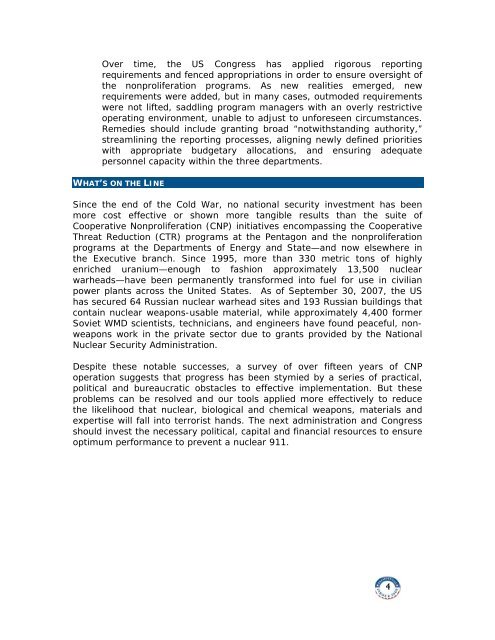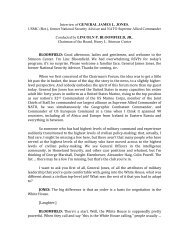Against All Odds: Preventing Terrorists from Getting Nuclear ...
Against All Odds: Preventing Terrorists from Getting Nuclear ...
Against All Odds: Preventing Terrorists from Getting Nuclear ...
You also want an ePaper? Increase the reach of your titles
YUMPU automatically turns print PDFs into web optimized ePapers that Google loves.
Over time, the US Congress has applied rigorous reporting<br />
requirements and fenced appropriations in order to ensure oversight of<br />
the nonproliferation programs. As new realities emerged, new<br />
requirements were added, but in many cases, outmoded requirements<br />
were not lifted, saddling program managers with an overly restrictive<br />
operating environment, unable to adjust to unforeseen circumstances.<br />
Remedies should include granting broad “notwithstanding authority,”<br />
streamlining the reporting processes, aligning newly defined priorities<br />
with appropriate budgetary allocations, and ensuring adequate<br />
personnel capacity within the three departments.<br />
WHAT’S ON THE LINE<br />
Since the end of the Cold War, no national security investment has been<br />
more cost effective or shown more tangible results than the suite of<br />
Cooperative Nonproliferation (CNP) initiatives encompassing the Cooperative<br />
Threat Reduction (CTR) programs at the Pentagon and the nonproliferation<br />
programs at the Departments of Energy and State—and now elsewhere in<br />
the Executive branch. Since 1995, more than 330 metric tons of highly<br />
enriched uranium—enough to fashion approximately 13,500 nuclear<br />
warheads—have been permanently transformed into fuel for use in civilian<br />
power plants across the United States. As of September 30, 2007, the US<br />
has secured 64 Russian nuclear warhead sites and 193 Russian buildings that<br />
contain nuclear weapons-usable material, while approximately 4,400 former<br />
Soviet WMD scientists, technicians, and engineers have found peaceful, nonweapons<br />
work in the private sector due to grants provided by the National<br />
<strong>Nuclear</strong> Security Administration.<br />
Despite these notable successes, a survey of over fifteen years of CNP<br />
operation suggests that progress has been stymied by a series of practical,<br />
political and bureaucratic obstacles to effective implementation. But these<br />
problems can be resolved and our tools applied more effectively to reduce<br />
the likelihood that nuclear, biological and chemical weapons, materials and<br />
expertise will fall into terrorist hands. The next administration and Congress<br />
should invest the necessary political, capital and financial resources to ensure<br />
optimum performance to prevent a nuclear 911.<br />
4
















